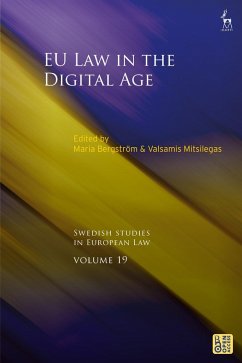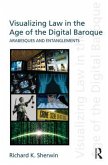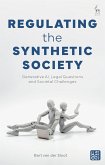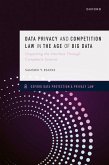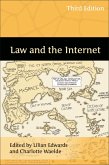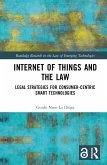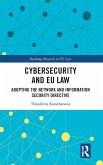EU Law in the Digital Age
Herausgeber: Bergström, Maria; Mitsilegas, Valsamis; Lundqvist, Björn
EU Law in the Digital Age
Herausgeber: Bergström, Maria; Mitsilegas, Valsamis; Lundqvist, Björn
- Gebundenes Buch
- Merkliste
- Auf die Merkliste
- Bewerten Bewerten
- Teilen
- Produkt teilen
- Produkterinnerung
- Produkterinnerung
Expert lawyers from across the full spectrum of EU law explore the impact of the digital age on the Union's legal framework.
Andere Kunden interessierten sich auch für
![Privacy and Personal Data Protection Law in Asia Privacy and Personal Data Protection Law in Asia]() Privacy and Personal Data Protection Law in Asia226,99 €
Privacy and Personal Data Protection Law in Asia226,99 €![Visualizing Law in the Age of the Digital Baroque Visualizing Law in the Age of the Digital Baroque]() Richard K SherwinVisualizing Law in the Age of the Digital Baroque93,99 €
Richard K SherwinVisualizing Law in the Age of the Digital Baroque93,99 €![Regulating the Synthetic Society Regulating the Synthetic Society]() Bart van der Sloot (the Netherlands Tilburg University)Regulating the Synthetic Society33,99 €
Bart van der Sloot (the Netherlands Tilburg University)Regulating the Synthetic Society33,99 €![Data Privacy and Competition Law in the Age of Big Data Data Privacy and Competition Law in the Age of Big Data]() Samson Y. Esayas (Associate Professor o Associate Professor of LawData Privacy and Competition Law in the Age of Big Data172,99 €
Samson Y. Esayas (Associate Professor o Associate Professor of LawData Privacy and Competition Law in the Age of Big Data172,99 €![Law and the Internet Law and the Internet]() Lilian Edwards / Charlotte Waelde (ed.)Law and the Internet108,99 €
Lilian Edwards / Charlotte Waelde (ed.)Law and the Internet108,99 €![Internet of Things and the Law Internet of Things and the Law]() Guido Noto La DiegaInternet of Things and the Law137,99 €
Guido Noto La DiegaInternet of Things and the Law137,99 €![Cybersecurity and EU Law Cybersecurity and EU Law]() Theodoros KarathanasisCybersecurity and EU Law148,99 €
Theodoros KarathanasisCybersecurity and EU Law148,99 €-
-
-
Expert lawyers from across the full spectrum of EU law explore the impact of the digital age on the Union's legal framework.
Hinweis: Dieser Artikel kann nur an eine deutsche Lieferadresse ausgeliefert werden.
Hinweis: Dieser Artikel kann nur an eine deutsche Lieferadresse ausgeliefert werden.
Produktdetails
- Produktdetails
- Verlag: Bloomsbury Academic
- Seitenzahl: 416
- Erscheinungstermin: 20. Februar 2025
- Englisch
- Abmessung: 234mm x 156mm x 25mm
- Gewicht: 454g
- ISBN-13: 9781509981182
- ISBN-10: 1509981187
- Artikelnr.: 71821222
- Herstellerkennzeichnung
- Libri GmbH
- Europaallee 1
- 36244 Bad Hersfeld
- gpsr@libri.de
- Verlag: Bloomsbury Academic
- Seitenzahl: 416
- Erscheinungstermin: 20. Februar 2025
- Englisch
- Abmessung: 234mm x 156mm x 25mm
- Gewicht: 454g
- ISBN-13: 9781509981182
- ISBN-10: 1509981187
- Artikelnr.: 71821222
- Herstellerkennzeichnung
- Libri GmbH
- Europaallee 1
- 36244 Bad Hersfeld
- gpsr@libri.de
Maria Bergström is Associate Professor of European Law and Senior Lecturer in EU Law at Uppsala University, Sweden. Valsamis Mitsilegas is Professor of European and Global Law and Dean of the School of Law and Social Justice at the University of Liverpool, UK.
Foreword: Key Developments in EU Law and the Role of the EU Court of
Justice, AG Maciej Szpunar (Court of Justice of the European Union)
1. Introduction, Maria Bergström (Uppsala University) and Valsamis
Mitsilegas (University of Liverpool)
Part One: AI General - What are the Challenges and Initiatives of AI?
2. AI and Justice - from Policy to Practice, Gösta Petri (European
Commission)
3. Council of Europe Initiatives on Artificial Intelligence with Special
Focus on the Right to Privacy and Data Protection, Peter Kimpian (Council
of Europe)
4. The Challenges of AI: A Mapping Exercise, Karine Caunes (CAIDP, Center
for AI and Digital Policy)
Part Two: Digital Data, Trust and Fundamental Rights in the Internal Market
Context
5. The EU's Digital Package: Striking a Balance for Fundamental Rights in
the Proposed DSA and DMA Regulations, Annegret Engel and Xavier Groussot
(Lund University)
6. Product Liability in the Future Framework of AI (Technology) Regulation,
Béatrice Schütte (University of Helsinki)
7. Defining Risk and Promoting Trust in AI Systems, Johanna Chamberlain and
Andreas Kotsios (Uppsala University)
8. The Proposed Anti-Money Laundering Authority and the Future of FIU
Collaboration in Europe, Eleni Kosta (TILT/Tilburg University)
Part Three: AI and Criminal Justice
9. Algorithmic Predictions, Justice and Privacy, Yulia Razmetaeva (Yaroslav
Mudryi National Law University, Kharkiv)
10. Artificial Intelligence in Criminal Justice: Strengthening or
Challenging the Rule of Law?, Emmanouil Billis (Max Planck Institute for
the Study of Crime, Security and Law)
11. Using AI Systems in the Promotion of EU Defence Rights: The
CrossJustice Project, Michele Caianiello (University of Bologna)
12. The Challenges of Deepfake Technology in the Context of Political
Disinformation, Clementina Salvi (Queen Mary University of London)
13. The UK's Strategy on AI - Implications for English Criminal Law, Rudi
Fortson (KC; Visiting Professor Queen Mary University of London; and
Honorary Visiting Professor of Law at the University of Liverpool)
Part Four: AI and Evidence
14. AI Evidence: Ensuring a Fair Trial in the Digital World, Katalin Ligeti
(University of Luxembourg)
15. AI-Based Means of Evidence and the Defendant's Rights in the European
Union, Eftychia Bampasika (LL.M., Attorney at Law)
16. Transborder Access to e-Evidence - Data Protection Concerns under the
e-Evidence Regulation, Teresa Quintel (European Parliament) and David Cole
(University of Luxembourg)
Part Five: AI and Migration, Databases and Mobility
17. The Traveller and the Digital Border, Elsbeth Guild (Queen Mary
University of London)
18. Towards Artificially Intelligent EU Migration, Asylum and Border
Management? The AI Act, Interoperable Large-Scale IT Systems and the Role
of Agencies, Niovi Vavoula (University of Luxembourg)
19. The Digital Border and the Rule of Law. Lessons from the Establishment
of the European Travel Information and Authorisation System (ETIAS),
Valsamis Mitsilegas (University of Liverpool)
20. Digital Controls, Mobility and Surveillance; the Social Universe of
"Reasonable Suspicion" and Its Different Guilds, Didier Bigo (Sciences Po
and King's College London)
Justice, AG Maciej Szpunar (Court of Justice of the European Union)
1. Introduction, Maria Bergström (Uppsala University) and Valsamis
Mitsilegas (University of Liverpool)
Part One: AI General - What are the Challenges and Initiatives of AI?
2. AI and Justice - from Policy to Practice, Gösta Petri (European
Commission)
3. Council of Europe Initiatives on Artificial Intelligence with Special
Focus on the Right to Privacy and Data Protection, Peter Kimpian (Council
of Europe)
4. The Challenges of AI: A Mapping Exercise, Karine Caunes (CAIDP, Center
for AI and Digital Policy)
Part Two: Digital Data, Trust and Fundamental Rights in the Internal Market
Context
5. The EU's Digital Package: Striking a Balance for Fundamental Rights in
the Proposed DSA and DMA Regulations, Annegret Engel and Xavier Groussot
(Lund University)
6. Product Liability in the Future Framework of AI (Technology) Regulation,
Béatrice Schütte (University of Helsinki)
7. Defining Risk and Promoting Trust in AI Systems, Johanna Chamberlain and
Andreas Kotsios (Uppsala University)
8. The Proposed Anti-Money Laundering Authority and the Future of FIU
Collaboration in Europe, Eleni Kosta (TILT/Tilburg University)
Part Three: AI and Criminal Justice
9. Algorithmic Predictions, Justice and Privacy, Yulia Razmetaeva (Yaroslav
Mudryi National Law University, Kharkiv)
10. Artificial Intelligence in Criminal Justice: Strengthening or
Challenging the Rule of Law?, Emmanouil Billis (Max Planck Institute for
the Study of Crime, Security and Law)
11. Using AI Systems in the Promotion of EU Defence Rights: The
CrossJustice Project, Michele Caianiello (University of Bologna)
12. The Challenges of Deepfake Technology in the Context of Political
Disinformation, Clementina Salvi (Queen Mary University of London)
13. The UK's Strategy on AI - Implications for English Criminal Law, Rudi
Fortson (KC; Visiting Professor Queen Mary University of London; and
Honorary Visiting Professor of Law at the University of Liverpool)
Part Four: AI and Evidence
14. AI Evidence: Ensuring a Fair Trial in the Digital World, Katalin Ligeti
(University of Luxembourg)
15. AI-Based Means of Evidence and the Defendant's Rights in the European
Union, Eftychia Bampasika (LL.M., Attorney at Law)
16. Transborder Access to e-Evidence - Data Protection Concerns under the
e-Evidence Regulation, Teresa Quintel (European Parliament) and David Cole
(University of Luxembourg)
Part Five: AI and Migration, Databases and Mobility
17. The Traveller and the Digital Border, Elsbeth Guild (Queen Mary
University of London)
18. Towards Artificially Intelligent EU Migration, Asylum and Border
Management? The AI Act, Interoperable Large-Scale IT Systems and the Role
of Agencies, Niovi Vavoula (University of Luxembourg)
19. The Digital Border and the Rule of Law. Lessons from the Establishment
of the European Travel Information and Authorisation System (ETIAS),
Valsamis Mitsilegas (University of Liverpool)
20. Digital Controls, Mobility and Surveillance; the Social Universe of
"Reasonable Suspicion" and Its Different Guilds, Didier Bigo (Sciences Po
and King's College London)
Foreword: Key Developments in EU Law and the Role of the EU Court of
Justice, AG Maciej Szpunar (Court of Justice of the European Union)
1. Introduction, Maria Bergström (Uppsala University) and Valsamis
Mitsilegas (University of Liverpool)
Part One: AI General - What are the Challenges and Initiatives of AI?
2. AI and Justice - from Policy to Practice, Gösta Petri (European
Commission)
3. Council of Europe Initiatives on Artificial Intelligence with Special
Focus on the Right to Privacy and Data Protection, Peter Kimpian (Council
of Europe)
4. The Challenges of AI: A Mapping Exercise, Karine Caunes (CAIDP, Center
for AI and Digital Policy)
Part Two: Digital Data, Trust and Fundamental Rights in the Internal Market
Context
5. The EU's Digital Package: Striking a Balance for Fundamental Rights in
the Proposed DSA and DMA Regulations, Annegret Engel and Xavier Groussot
(Lund University)
6. Product Liability in the Future Framework of AI (Technology) Regulation,
Béatrice Schütte (University of Helsinki)
7. Defining Risk and Promoting Trust in AI Systems, Johanna Chamberlain and
Andreas Kotsios (Uppsala University)
8. The Proposed Anti-Money Laundering Authority and the Future of FIU
Collaboration in Europe, Eleni Kosta (TILT/Tilburg University)
Part Three: AI and Criminal Justice
9. Algorithmic Predictions, Justice and Privacy, Yulia Razmetaeva (Yaroslav
Mudryi National Law University, Kharkiv)
10. Artificial Intelligence in Criminal Justice: Strengthening or
Challenging the Rule of Law?, Emmanouil Billis (Max Planck Institute for
the Study of Crime, Security and Law)
11. Using AI Systems in the Promotion of EU Defence Rights: The
CrossJustice Project, Michele Caianiello (University of Bologna)
12. The Challenges of Deepfake Technology in the Context of Political
Disinformation, Clementina Salvi (Queen Mary University of London)
13. The UK's Strategy on AI - Implications for English Criminal Law, Rudi
Fortson (KC; Visiting Professor Queen Mary University of London; and
Honorary Visiting Professor of Law at the University of Liverpool)
Part Four: AI and Evidence
14. AI Evidence: Ensuring a Fair Trial in the Digital World, Katalin Ligeti
(University of Luxembourg)
15. AI-Based Means of Evidence and the Defendant's Rights in the European
Union, Eftychia Bampasika (LL.M., Attorney at Law)
16. Transborder Access to e-Evidence - Data Protection Concerns under the
e-Evidence Regulation, Teresa Quintel (European Parliament) and David Cole
(University of Luxembourg)
Part Five: AI and Migration, Databases and Mobility
17. The Traveller and the Digital Border, Elsbeth Guild (Queen Mary
University of London)
18. Towards Artificially Intelligent EU Migration, Asylum and Border
Management? The AI Act, Interoperable Large-Scale IT Systems and the Role
of Agencies, Niovi Vavoula (University of Luxembourg)
19. The Digital Border and the Rule of Law. Lessons from the Establishment
of the European Travel Information and Authorisation System (ETIAS),
Valsamis Mitsilegas (University of Liverpool)
20. Digital Controls, Mobility and Surveillance; the Social Universe of
"Reasonable Suspicion" and Its Different Guilds, Didier Bigo (Sciences Po
and King's College London)
Justice, AG Maciej Szpunar (Court of Justice of the European Union)
1. Introduction, Maria Bergström (Uppsala University) and Valsamis
Mitsilegas (University of Liverpool)
Part One: AI General - What are the Challenges and Initiatives of AI?
2. AI and Justice - from Policy to Practice, Gösta Petri (European
Commission)
3. Council of Europe Initiatives on Artificial Intelligence with Special
Focus on the Right to Privacy and Data Protection, Peter Kimpian (Council
of Europe)
4. The Challenges of AI: A Mapping Exercise, Karine Caunes (CAIDP, Center
for AI and Digital Policy)
Part Two: Digital Data, Trust and Fundamental Rights in the Internal Market
Context
5. The EU's Digital Package: Striking a Balance for Fundamental Rights in
the Proposed DSA and DMA Regulations, Annegret Engel and Xavier Groussot
(Lund University)
6. Product Liability in the Future Framework of AI (Technology) Regulation,
Béatrice Schütte (University of Helsinki)
7. Defining Risk and Promoting Trust in AI Systems, Johanna Chamberlain and
Andreas Kotsios (Uppsala University)
8. The Proposed Anti-Money Laundering Authority and the Future of FIU
Collaboration in Europe, Eleni Kosta (TILT/Tilburg University)
Part Three: AI and Criminal Justice
9. Algorithmic Predictions, Justice and Privacy, Yulia Razmetaeva (Yaroslav
Mudryi National Law University, Kharkiv)
10. Artificial Intelligence in Criminal Justice: Strengthening or
Challenging the Rule of Law?, Emmanouil Billis (Max Planck Institute for
the Study of Crime, Security and Law)
11. Using AI Systems in the Promotion of EU Defence Rights: The
CrossJustice Project, Michele Caianiello (University of Bologna)
12. The Challenges of Deepfake Technology in the Context of Political
Disinformation, Clementina Salvi (Queen Mary University of London)
13. The UK's Strategy on AI - Implications for English Criminal Law, Rudi
Fortson (KC; Visiting Professor Queen Mary University of London; and
Honorary Visiting Professor of Law at the University of Liverpool)
Part Four: AI and Evidence
14. AI Evidence: Ensuring a Fair Trial in the Digital World, Katalin Ligeti
(University of Luxembourg)
15. AI-Based Means of Evidence and the Defendant's Rights in the European
Union, Eftychia Bampasika (LL.M., Attorney at Law)
16. Transborder Access to e-Evidence - Data Protection Concerns under the
e-Evidence Regulation, Teresa Quintel (European Parliament) and David Cole
(University of Luxembourg)
Part Five: AI and Migration, Databases and Mobility
17. The Traveller and the Digital Border, Elsbeth Guild (Queen Mary
University of London)
18. Towards Artificially Intelligent EU Migration, Asylum and Border
Management? The AI Act, Interoperable Large-Scale IT Systems and the Role
of Agencies, Niovi Vavoula (University of Luxembourg)
19. The Digital Border and the Rule of Law. Lessons from the Establishment
of the European Travel Information and Authorisation System (ETIAS),
Valsamis Mitsilegas (University of Liverpool)
20. Digital Controls, Mobility and Surveillance; the Social Universe of
"Reasonable Suspicion" and Its Different Guilds, Didier Bigo (Sciences Po
and King's College London)

